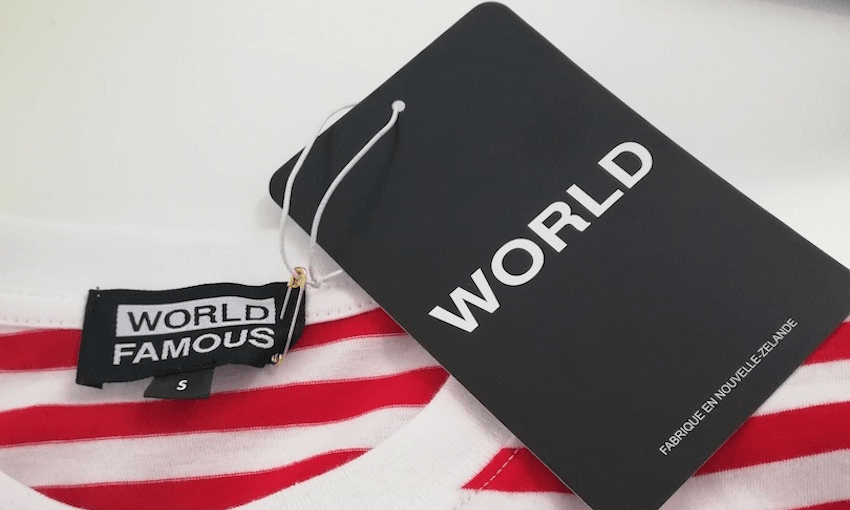After its initial stubborn refusal to accept wrongdoing and attacking the integrity of Spinoff reporting, the NZ fashion retailer WORLD has changed its tune, accepting a likely breach of law over clothing labels, following a Commerce Commission investigation.
New Zealand fashion label WORLD has accepted the Commerce Commission’s view that labelling on some imported clothing was liable to mislead consumers about the place of origin of the clothing. WORLD’s acknowledgment that it was likely to have breached the law stands in stark contrast to remarks by the label’s founder Dame Denise L’Estrange-Corbet, who called the Spinoff’s reporting “not truthful” “trash” and “gutter journalism”.
WORLD has agreed that it will not use any tag or labelling with the phrase “Fabrique en Nouvelle Zelande” on any imported garments, and will refund any customers who return garments at issue bought under the impression that they were made in New Zealand, the Commerce Commission said.
From 2009 to May 2018, WORLD estimates that it offered just over 1,100 t-shirts, sweatshirts and sweatpants for sale in retail stores which were manufactured overseas but claimed “Fabrique en Nouvelle Zelande”.
In essence, WORLD has undertaken to not put their “Fabrique en Nouvelle Zelande” tags on clothing manufactured overseas, but apparently escaped any greater sanction.
The inquiry was launched after a Spinoff investigation, published in May, revealed that t-shirts manufactured in Bangladesh had WORLD labels attached saying Fabriqué En Nouvelle Zelande, ‘Made in NZ’. Following the story’s publication, the Commerce Commission received nine complaints regarding WORLD’s labelling.
The Spinoff found that t-shirts, sweatshirts, and sweatpants manufactured in Bangladesh and China were being sold by WORLD with “Fabriqué En Nouvelle Zelande”, which translates as “Made in New Zealand”, printed on the tags.
The actual place of manufacture could be found low on the inside seam, near the hem and out of sight.
The t-shirts sported sequin patches made in Hong Kong and available for purchase from Chinese online market, AliExpress.
It is mandatory for all new clothing or footwear sold in New Zealand to state the country of origin where the consumer can clearly see it. The Commerce Commission has previously explained: “The label must be a permanent label which the buyer can see when examining the clothing. In the commission’s view origin labels in side seams of garments are unlikely to meet this legal requirement. Origin labels should be clearly positioned in the neck area of the garments.”
Despite multiple claims from L’Estrange-Corbet that their garments did have the country of origin clearly stated in the neck area, the Spinoff visited WORLD stores the same day to find all t-shirts with no such thing. The only country mentioned was ‘Nouvelle Zelande” on the swing tag.
WORLD’s Dame Denise hotly disputed the Spinoff’s reporting at the time, insisting that because the labels themselves were made in New Zealand, attaching them to clothing made in Bangladesh was not misleading.
L’Estrange-Corbet, a longtime, vocal critic of clothing companies that manufacture off shore, said WORLD had no choice but to purchase their t-shirts through AS Colour, who manufacture offshore. “We were unable to manufacture the garments here,” she told The Spinoff, “as there are specialist machinery required, which we did not have access to any longer.” Soon after, a number of New Zealand clothing companies such as Cactus made it known that they continue to manufacture t-shirts locally.
